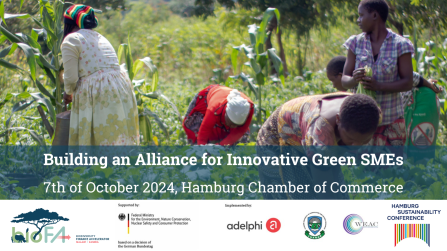Global Entrepreneurs Discuss Green Innovative SMES at the Hamburg Sustainability Conference
| Date |
Date
|

Entrepreneurs and policymakers gathered at a side event at the Hamburg Sustainability Conference co-hosted by SEED to spotlight the essential role of Micro, Small, and Medium-sized Enterprises (MSMEs) in driving the transition towards circular and low-carbon economies. The event, moderated by Urmi Goswami from The Economic Times, brought together key players in sustainability to discuss entrepreneurship policy frameworks and the innovative actions of SMEs, especially from developing countries.
The event kicked off with opening addresses by Stephan Contius, representing F20, and Arab Hoballah of SEED, who framed the conversation around the strategic importance of SMEs in global climate goals. Melanie Hauenstein, Director of the UNDP representation in Germany, and Diane Holdorf, Executive Vice-President of the World Business Council for Sustainable Development (WBCSD), emphasized the international and national perspectives needed to support the green economy and SMEs’ pivotal role in that transition.
The first panel discussion focused on entrepreneurship policy frameworks that enable circular and low-carbon economies. It featured prominent voices like Arnold Kreilhuber (UNEP), Moustapha Kamal Gueye (ILO), Hajnalka Petrics (FAO), and Dunja Krause (UNRISD), with each offering insights on how their organizations support green enterprises and SMEs through policies, funding, and resources.
One of the most thought-provoking points raised was the idea that "No circular economy and no net zero without SMEs" — a statement that resonated deeply with panelists. This highlighted the need for immediate action to scale up support for SMEs in circular economy transitions. The panel also explored how organizations like ILO and FAO are actively working to improve SME efficiency and enhance networking opportunities among stakeholders, including large companies, funding partners, and chambers of commerce.
The second panel featured SME leaders from Indonesia, Zambia, and Malawi, who shared their experiences in eco-inclusive innovation. Adi Reza, CEO of Mycotech in Indonesia, discussed the challenges of scaling up innovative, sustainable materials derived from fungi. Farhana Mulla Handondo, Co-founder of Forest Africa Zambia Ltd, and Thokozani Chimasula, Founder of Tac-Maz Sustainable Ventures in Malawi, shared their journey of building resilient green businesses focused on sustainable agriculture and forest management.
A key takeaway from this panel was the need to amplify the successes of SMEs and accelerate the scaling of their innovations. Participants reflected on the support required from governments and the international community to multiply these success stories, ensuring that more SMEs can lead the charge in green economies. The discussion also touched upon how regulations like the EU Green Claims Directive and the German Due Diligence Law impact SMEs operating in sustainable value chains.
As the event concluded, Stephan Contius and Arab Hoballah unveiled the Entrepreneurship Breakthrough Initiative, which seeks to build a global “Alliance for Innovative Green SMEs.” This initiative will serve as an accelerator platform to advocate for green SMEs, providing the financial and technical support needed to scale their impact on circular and low-carbon economies. The launch was met with enthusiasm from attendees, who acknowledged that while SMEs are increasingly recognized on international platforms, their voices still need to be heard more effectively. The alliance aims to bridge this gap by uniting stakeholders across the public and private sectors to drive tangible action in support of SME innovations.
The event provided an important platform for sharing ideas, building partnerships, and setting the course for future collaborations aimed at scaling sustainable innovations led by SMEs worldwide. With the participation of leading international organizations and entrepreneurial success stories, the forum strengthened the call for global cooperation in creating a more sustainable, equitable, and resilient economy.
